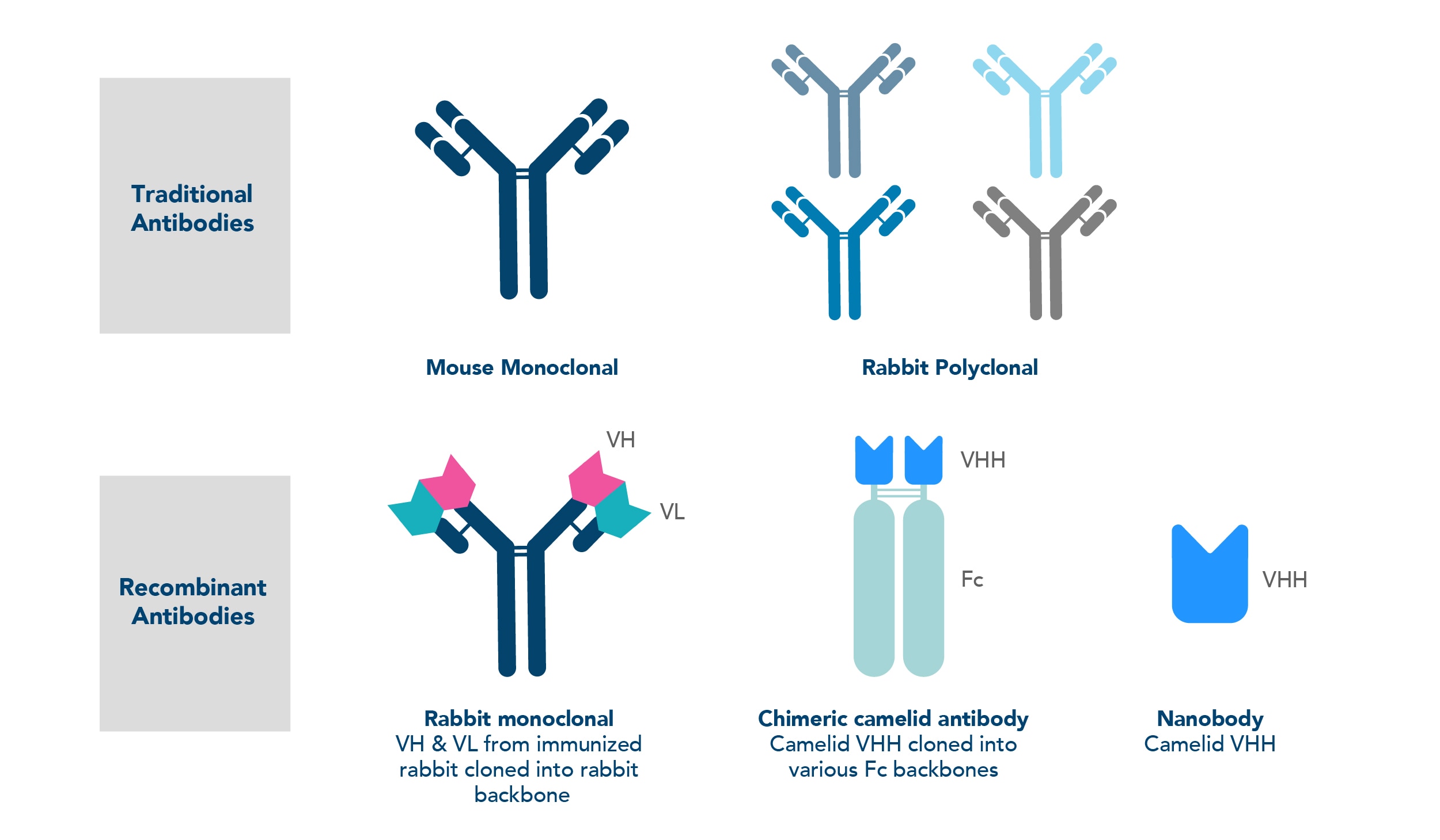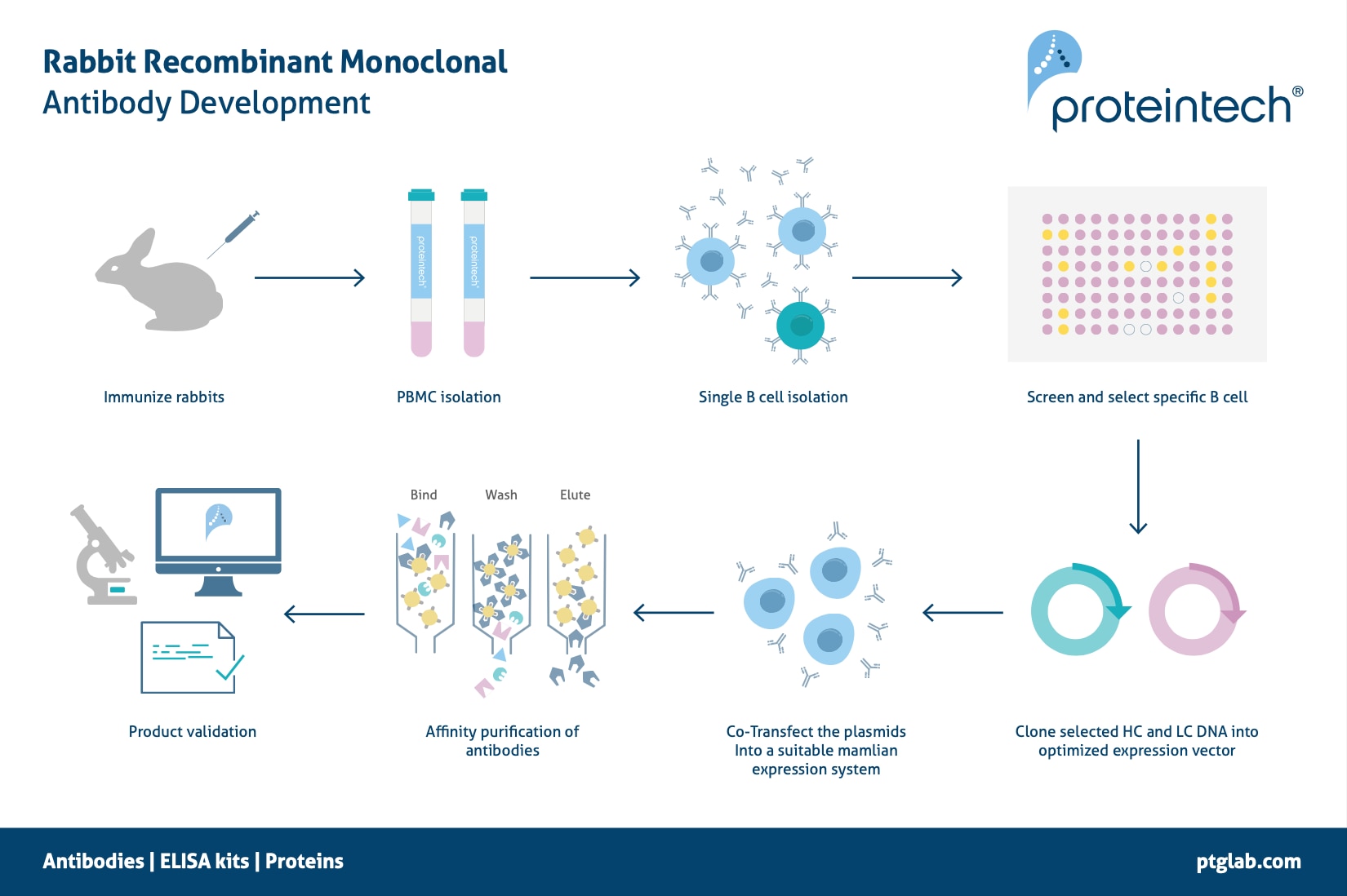Recombinant antibodies
Antibodies have been a critical reagent in biological research for decades.
Recently, due to issues surrounding scientific reproducibility, there is a growing need for antibodies with extraordinary specificity and minimal lot variability.
Until recently, this was not possible. However, recent advances in molecular biology and screening have enabled production of genetically defined, recombinant antibodies.
Due to their low lot-to-lot variability and high specificity, recombinant antibodies are being touted as the future of antibodies in research paving the way for researchers to have unrivalled reproducibility and trust in these reagents.
What are recombinant antibodies?
There are many methods of producing recombinant antibodies. At Proteintech, recombinant antibodies are monoclonal antibodies
that have been produced by in vitro cloning of the antibody heavy and light chain DNA sequences from the B cells or plasma cells of immunized animals.
Unlike traditional monoclonal antibodies produced from hybridomas, the recombinant vectors are introduced into expression hosts (e.g. E. coli) to then
produce the antibodies. This recombinant technology results in almost no lot-to-lot variability, removing the risk of genetic drift that can result in
variations in of monoclonal antibodies.

Why choose a recombinant antibody?
High lot-to-lot consistency
The storage of DNA libraries of antibody sequences and subsequent use of recombinant technology ensures that antibody production is highly consistent and reliable, minimizing the risk of genetic drift and providing superior antibody supply over time.
Continuous supply
Due to the nature of recombinant antibody production, recombinant antibodies have a decreased production time and large-scale manufacturing of recombinant antibodies is easier to achieve. Therefore, with almost no variation between batches and the ease of scalability, recombinant antibodies are perfect for long-term projects or experiments where high volumes of antibody are required. Monoclonal and polyclonal antibody production can sometimes face issues of low yield, therefore using recombinant production enables manufacturers to circumvent this issue.
Increased sensitivity and higher affinity
Once the sequence of an antibody has been cloned for recombinant production, it is then possible to modify the sequence in order to generate antibodies which can bind with higher affinity and specificity to its target. Antibody engineering also enables the creation of antibody “chimeras”, whereby the Fc portion of the antibody can be changed to that of a different species.
Difficult target selection
Some targets, such as specific protein isoforms or phosphorylated proteins can be very difficult to produce high quality and reliable antibodies using mouse hybridoma technology. Due to recombinant technology enabling antibody engineering from species with richer immune diversity than mice like rabbits and llamas,specific antibodies towards these hard targets can be produced.
Animal-free production
The need for animal-free technologies is increasingly required and encouraged around the world. In recombinant production, once the antibody sequence is cloned following immunization, the need for animals is eliminated.This process can even create antibodies from non-traditional sources. For example, our SARS-COV-2 S-protein recombinant antibodies are derived from small samples of convalescent patient sera.
Recombinant antibody production at Proteintech
At Proteintech, we create rabbit recombinant antibodies. Rabbits have superior
qualities for recombinant antibody production over other methods, harnessing their natural
immune response for its evolutionarily honed epitope recognition, high antibody diversity,
and single isotype subclass.
Proteintech’s recombinant antibody development starts with rabbit immunization. As the immune
response peaks, antigen-specific single B cells from the rabbits are isolated using our proprietary
technology. The selected B cells are then screened for their ability to produce antibodies with
highest sensitivity and specificity. The genes for the antibody heavy and light chains from the
selected B cells are then cloned into cell lines to express the desired antibody. These antibodies
are extensively validated, adhering to the IWGAV (International Working Group on Antibody Validation)
recommendation to prove the specificity, sensitivity, and reproducibility.

ChromoTek Recombinant VHH Fusion Antibodies
Nanobodies, the binding domains of heavy chain antibodies from Camelidae family members,
can also be fused to Fc-domains to generate chimeric heavy chain antibodies. The Fc-domain fusion
format combines the advantages of Nanobodies with those of traditional antibodies: The VHH/Fc fusions (i)
are bivalent so they have even higher avidities and affinities than the parent Nanobodies, (ii) bind unique,
3-dimensinal conformations of epitopes not recognized by traditional antibodies, and (iii) can be detected
and captured using tools from the broad range of antibody reagents like secondary antibodies and Nano-Secondaries.
Like other recombinant antibodies, VHH/Fc-fusions are available with high lot-to-lot consistency at an unlimited
supply. The Nanobody Fc-fusion recombinant antibodies have been developed in collaboration with
Absolute Antibody Ltd.
Proteintech and ChromoTek offer nanobodies fused to two different Fc-domains - rabbit IgG and mouse IgG1 –
for flexibility in your experiments. The popular ChromoTek Nanobodies anti-GFP-, anti-mNeonGreen, anti-TurboGFP-,
and anti-vimentin-VHHs are all available in chimeric rabbit IgG and mouse IgG1 form.
Product highlights:
- Popular nanobodies cited in over 2000 papers are fused to rabbit IgG or mouse IgG1 Fc-domains
- Unique epitopes that traditional antibodies do not recognize
- Bivalent structure results in higher avidity and better signal amplification than Nanobodies
- Unlimited supply, high lot-to-lot consistency
- Recombinant expression
- Compatibility with Nano-Secondaries
| Product | Application | Fc domain | ||
|---|---|---|---|---|
| GFP VHH-Fc fusion | ||||
| GFP recombinant antibody, VHH-mouse IgG1 Fc fusion [CTK0201] | IF | mouse IgG1 Fc | ||
| GFP recombinant antibody, VHH-rabbit IgG Fc fusion [CTK0201] | IF | rabbit IgG Fc | ||
| mNeonGreen VHH-Fc fusion | ||||
| mNeonGreen recombinant antibody, VHH-mouse IgG1 Fc fusion [CTK0203] | IF | mouse IgG1 Fc/td> | ||
| mNeonGreen recombinant antibody, VHH-rabbit IgG Fc fusion [CTK0203] | IF | rabbit IgG Fc | ||
| TurboGFP VHH-Fc fusion | ||||
| TurboGFP recombinant antibody, VHH-mouse IgG1 Fc fusion [CTK0204] | IF | mouse IgG1 Fc | ||
| TurboGFP recombinant antibody, VHH-rabbit IgG Fc fusion [CTK0204] | IF | rabbit IgG Fc | ||
| Vimentin VHH-Fc fusion | ||||
| Vimentin recombinant antibody, VHH-mouse IgG1 Fc fusion [CTK0211] | IF | mouse IgG1 Fc | ||
| VVimentin recombinant antibody, VHH-rabbit IgG Fc fusion [CTK0211] | IF | rabbit IgG Fc | ||
Products
TDP-43 Recombinant antibody
Shows reactivity with Human, Mouse and Rat.
| Cat No: | Applications |
| 80001-1-RR | WB, IHC, FC,ELISA |
Phospho-JNK (Tyr185) Recombinant antibody
Shows reactivity with Human, Mouse and Rat.
| Cat No: | Applications |
| 80024-1-RR | WB, ELISA |
DYKDDDDK tag Recombinant antibody
Binds to FLAG® tag epitope. Shows reactivity with recombinant proteins and human.
| Cat No: | Applications |
| 80010-1-RR | WB, IP, IF, ELISA |
smooth muscle actin specific Recombinant antibody
Shows reactivity with Human, Mouse, Rat, Chicken and Pig.
| Cat No: | Applications |
| 80008-1-RR | WB, IHC, IF, ELISA |
TDP-43 Recombinant antibody
Shows reactivity with Human, Mouse and Rat.
| Cat No: | Applications |
| 80001-1-RR | WB, IHC, FC,ELISA |
Non visible text
Phospho-JNK (Tyr185) Recombinant antibody
Shows reactivity with Human, Mouse and Rat.
| Cat No: | Applications |
| 80024-1-RR | WB, ELISA |
Non visible text
DYKDDDDK tag Recombinant antibody
Binds to FLAG® tag epitope. Shows reactivity with recombinant proteins and human.
| Cat No: | Applications |
| 80010-1-RR | WB, IP, IF, ELISA |
smooth muscle actin specific Recombinant antibody
Shows reactivity with Human, Mouse, Rat, Chicken and Pig.
| Cat No: | Applications |
| 80008-1-RR | WB, IHC, IF, ELISA |
Non visible text
V5-tag Monoclonal antibody (SV5-P-K)
Some quick example text to build on the card title and make up the bulk of the card's content.
| Cat No: | Specificity |
| v5ab | V5-Tag (GKPIPNPLLGLDST) |
Non visible text
METTL3 Recombinant antibody
Shows reactivity with Human, Mouse and Rat
| Cat No: | Applications |
| 6643-lg: | WB, IHC, IF, ELISA |
Non visible text
ACE2 Recombinant antibody
Shows reactivity with Human.
| Cat No: | Applications |
| 80063-1-RR | HC, ELISA |
Non visible text

